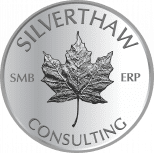In today’s business landscape, Enterprise Resource Planning (ERP) systems have become a central tool for organizations seeking to enhance efficiency, streamline operations, and drive growth. Implementing an ERP system is a significant decision, as it involves substantial investments in terms of time, money, and resources. Therefore, it’s crucial to assess your readiness for ERP adoption before taking the plunge. In this blog post, we will explore the key indicators that can help you determine whether your organization is ready for an ERP system.
1. Clear Business Objectives and Strategy
ERP implementation isn’t just about installing software; it’s about aligning technology with your organization’s strategic goals. If your business has a well-defined set of objectives and a strategy for achieving them, it’s a strong sign that you might be ready for ERP. ERP can help you execute and monitor your strategy by providing tools for real-time data analysis and performance tracking.
2. Growth and Scalability Needs
As your business grows, so does its complexity. If you find that your current systems struggle to keep up with the demands of an expanding operation, ERP might be the solution. An ERP system is designed to scale with your business, adapting to your changing needs, and accommodating additional users, products, or processes.
3. Data Management Challenges
Are you drowning in data but struggling to derive meaningful insights from it? If your data is dispersed across various systems, causing data duplication, errors, or inefficiencies, an ERP system can bring order to the chaos. It centralizes data, ensuring accuracy, consistency, and accessibility across the organization.
4. Inefficient Workflows
If your current processes are riddled with manual, time-consuming tasks, leading to inefficiencies and errors, ERP can help. ERP automates routine tasks, streamlining workflows and reducing the risk of human error. This results in a more productive and cost-effective operation.
5. Complex Compliance Requirements
Industries like healthcare, finance, and manufacturing often have complex regulatory requirements. If your organization must adhere to strict compliance rules, an ERP system can help ensure that you remain compliant. It can automate compliance monitoring and reporting, reducing the risk of costly violations.
6. Customer and Supplier Demands
In a customer-centric world, meeting customer demands is crucial. An ERP system can enhance customer service by providing a 360-degree view of customer interactions and histories. Similarly, it can help manage supplier relationships, optimize procurement, and keep supply chains running smoothly.
7. Multiple Disparate Systems
If your organization relies on multiple software applications and databases that don’t communicate effectively, it may be time for an ERP. ERP consolidates these systems into one, creating a unified platform for data and process management. This not only reduces complexity but also allows for more comprehensive reporting and analysis.
8. Complex Inventory Management
For businesses that manage intricate inventory systems, such as warehouses with thousands of products, accurate inventory control can be a challenge. ERP offers sophisticated inventory management capabilities, helping optimize stock levels, reduce carrying costs, and prevent stockouts or overstock situations.
9. Reporting and Analytics Needs
Data-driven decision-making is a cornerstone of modern business. If your organization requires real-time insights into financial performance, sales, customer behaviour, or other key metrics, ERP systems come equipped with robust reporting and analytics tools that can deliver the data you need.
10. Employee Training and Change Management
Implementing an ERP system requires training employees and adapting to new processes. If your organization is willing and prepared to invest time and resources in training and change management, you’re on the right path to ERP readiness. Successful ERP adoption hinges on employees embracing the change and maximizing the system’s capabilities.
11. Adequate Resources and Budget
ERP implementation is not just a financial investment; it also requires dedicated resources and personnel. It’s crucial to assess whether your organization has the necessary budget, staffing, and commitment to make ERP a success.
In conclusion, ERP adoption is a substantial undertaking, and not all organizations are equally prepared for it. However, if your business aligns with the aforementioned indicators, it may be the right time to explore ERP solutions. ERP systems can revolutionize your operations, optimize processes, and provide a competitive edge in an ever-evolving business landscape. It’s essential to thoroughly evaluate your organization’s readiness and engage in careful planning before embarking on an ERP implementation journey.
